Exploring Place-based Education Programs in the Pacific Northwest
by Becs Boyd
A visit to Kennedy High School in Cottage Grove, Oregon on 18 November, turns out to be one of the most uplifting days I have spent in a school, perhaps ever.
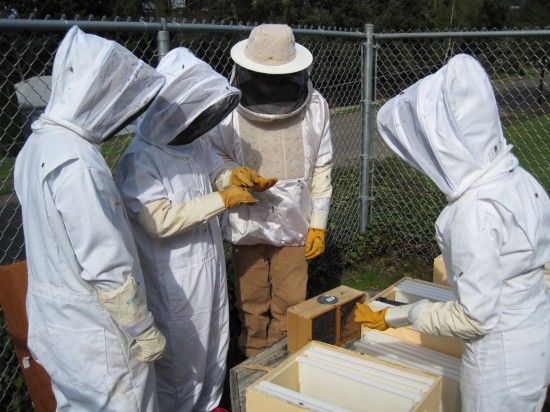 There are a myriad of small things that contribute to this caring culture. For example, Horn’s approach to students who have been referred to his office, ‘When a student has been sent to me, maybe there are difficulties with the teacher, they know to grab a cup of tea. Then they read the quote on the Yogi tea, and then they grab their journal and then they write. What that does is it diffuses the anger and the distress they are feeling, and then they relate this to their life and we have a conversation. There are no discipline problems around here.’ Classes often begin and end with circle time, first an ‘expectations’ circle, where students and teachers state their hopes and expectations for their role in the class, and finally an ‘appreciations’ circle, where students are able to exchange thanks and appreciations for others’ role.
There are a myriad of small things that contribute to this caring culture. For example, Horn’s approach to students who have been referred to his office, ‘When a student has been sent to me, maybe there are difficulties with the teacher, they know to grab a cup of tea. Then they read the quote on the Yogi tea, and then they grab their journal and then they write. What that does is it diffuses the anger and the distress they are feeling, and then they relate this to their life and we have a conversation. There are no discipline problems around here.’ Classes often begin and end with circle time, first an ‘expectations’ circle, where students and teachers state their hopes and expectations for their role in the class, and finally an ‘appreciations’ circle, where students are able to exchange thanks and appreciations for others’ role.
An important element for Horn has been caring for his staff and giving them the space and time they need to develop their own practices. He is a hands-on leader who at least once a week will combine two classes and substitute for two teachers to free them up to do preparation. On Fridays, when the primary focus is on projects, community service and conservation, he takes over these activities to give his staff half a day for meeting and preparation.
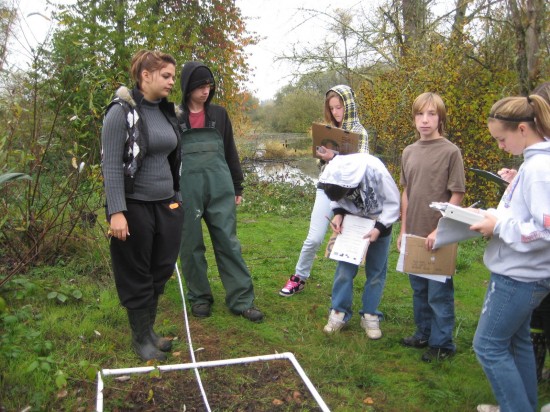 A second step has been to build a strong school ethos based on sustainability and service, which builds not only self esteem but also practical skills and wisdom. School activities are structured around five themes of sustainability – Agriculture, Architecture, Energy, Forests and Water. Horn has sought to develop a range of programmes with community partners that address each of these issues. Within each theme there is a focus on practical problem solving, academic skills, and on creating future employment opportunities . According to Horn, ‘Kennedy represents a new paradigm or a new way of thinking about education. It’s project based, it’s place-based and it allows students to engage in constructive activities that relate specifically to real-world issues, around sustainability and around environmental issues that are affecting us all’.
A second step has been to build a strong school ethos based on sustainability and service, which builds not only self esteem but also practical skills and wisdom. School activities are structured around five themes of sustainability – Agriculture, Architecture, Energy, Forests and Water. Horn has sought to develop a range of programmes with community partners that address each of these issues. Within each theme there is a focus on practical problem solving, academic skills, and on creating future employment opportunities . According to Horn, ‘Kennedy represents a new paradigm or a new way of thinking about education. It’s project based, it’s place-based and it allows students to engage in constructive activities that relate specifically to real-world issues, around sustainability and around environmental issues that are affecting us all’.
The wide range of ambitious projects in which students have been involved include:
– growing fresh organic food for themost in need in the community (over 3 tonnes to date), – partnering with the County to implement mitigation measures at a landfill site,
– gathering water monitoring data at industrial outflow sites as part of an annual canoe trip from Eugene to Portland,
– developing a low-cost energy efficient green housing prototype, which it is hoped could ameliorate housing conditions at the trailer parks on which many of the students live,
– learning how to build a straw bale house at the local energy research and education centre, Approvecho
– carrying out invasive species removal work through the school conservation corps, in partnership with the US Forest Service, the Bureau of Land Management, and the Coast Fork Watershed Council.
Both teachers and students find this approach stimulating and enjoyable. Kris Olsen again, ‘One of the reasons I really love teaching at Kennedy is the focus on sustainability. Its also really important to be teaching material that’s relevant and I really don’t think there’s anything more relevant than issues around sustainability. The reality is that the future that these kids have is going to be really different from what our lives look like right now. They need to be ready to deal with issues around energy and sustaining our forests and a more sustainable food system.’
A student named Morgan talks to me enthusiastically, ‘I’ve been to all kinds of schools and this is best school I’ve been to. It’s cool because you get to go out and do lots of great things, like growing stuff in the garden, forestry work, environmental work. It changes the way you see things. There’s a lot more respect here too, between us and the teachers.’
This place and project based approach has been essential for breaking down the barriers between school and community. As Horn says, ‘my first thought was that you really need to engage kids in the life of the community, outside of the school. So if it’s that segregation, where they walk in the front door of the school and they don’t go out you really just have this little petri dish where it’s difficult forkids to relate to the real world.’ The standing of the school within the community, and the sense of self-respect disadvantaged communities have for themselves, have also grown dramatically as practical projects have begun to make a difference to local environmental and social issues. Now parents wave as Horn cycles past some of the poorest and most challenged trailer parks in the area. One of his next plans is for a community garden and cafe right in the centre of one of these parks.
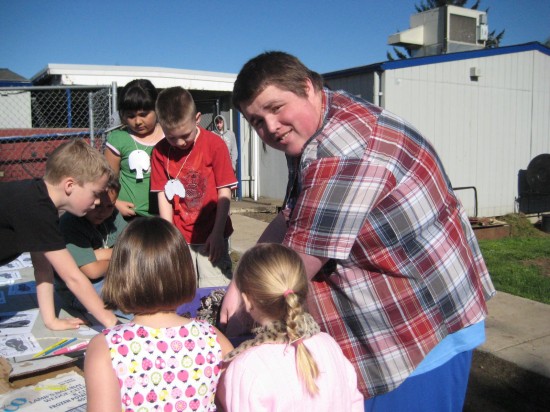 There is also a philosophy of helping others to learn. Kennedy students teach in local elementary schools. As Horn says, ‘all of our kids have now taught agriculture, bee-keeping, water-testing, aquaculture with hydroponics. They’re teaching third graders and fourth graders these skills. And what’s happening is they have to prepare and they’re nervous and you see these toughest of tough kids, you know their eyes tear up and their voice shakes when they’re infront of a bunch of third graders. It’s beautiful to see actually. And then they come back and go ‘I’m never misbehaving ever again, that’s really hard, that teaching’.
There is also a philosophy of helping others to learn. Kennedy students teach in local elementary schools. As Horn says, ‘all of our kids have now taught agriculture, bee-keeping, water-testing, aquaculture with hydroponics. They’re teaching third graders and fourth graders these skills. And what’s happening is they have to prepare and they’re nervous and you see these toughest of tough kids, you know their eyes tear up and their voice shakes when they’re infront of a bunch of third graders. It’s beautiful to see actually. And then they come back and go ‘I’m never misbehaving ever again, that’s really hard, that teaching’.
Currently student performance is measured on the basis of State tests. In order to gain a sense of the broader learning that each student is gaining, Horn already ensures that each builds up a portfolio of written work. But he is also planning a more radical move away from narrow subject assessment to a mode of assessment that fits better with the personal and social development that the school offers, ‘The one thing we’re looking at doing next year is doing away with the grading system, the ABCDF and moving toward a narrative system. So each student will have a description of what they’re good at and what they need to work on’. This can take account of the ‘portfolio of adventurous experiences’, from beekeeping to winter camping to community project work to performing at an ‘open mike’ at the local Axe and Fiddle cafe, which Horn believes can have a transformative impact on a student’s life.
Horn is also working on plans for a ‘walkabout’, which would be a prequisite for graduation. ‘Walkabout’ would be an experiential learning, self-driven, self-developed project that fosters good citizenship and also involves some sort of transformative experience. Horn says, ‘It’s not just ‘go create a project and good luck’. There’s a rubric, a step by step process. It’s been highly successful elsewhere…And kids chronicle their transformation in the process. Where kids are self-driven and it becomes a part of the culture for them to participate in something that is meaningful to them, that has positive experience and has intentional positive effect on the community.’
Finding resources (in addition to the allowance for salaries supplied by the State) to sustain school activities falls largely to Horn, but he is aware that the nature of the school and the kinds of issues it tackles give it a distinct advantage when it comes to finding funds. Partnerships with business and State agencies have proven highly successful. During the 2009-2010 academic year alone, for example, the school brought in approximately $700,000 to support its programmes and provide employment opportunities for its students.
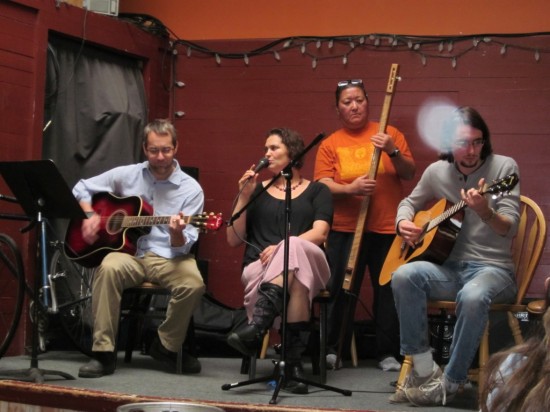 Tom Horn and I spend the last hours of the afternoon at the local Axe and Fiddle, owned by the inspirational Hoedads founder Hal Hartzell, watching students perform at the monthly ‘open mike’. There is no dedicated music teacher at Kennedy, but many of the staff sing or play instruments and have passed on their skills to the students. It is impressive how hard students have worked to rehearse songs and compose their own lyrics, and it clearly takes a lot of courage for some of them to stand up there in front of their peers. Horn himself is persuaded to take a turn on the guitar with a band of other staff.
Tom Horn and I spend the last hours of the afternoon at the local Axe and Fiddle, owned by the inspirational Hoedads founder Hal Hartzell, watching students perform at the monthly ‘open mike’. There is no dedicated music teacher at Kennedy, but many of the staff sing or play instruments and have passed on their skills to the students. It is impressive how hard students have worked to rehearse songs and compose their own lyrics, and it clearly takes a lot of courage for some of them to stand up there in front of their peers. Horn himself is persuaded to take a turn on the guitar with a band of other staff.
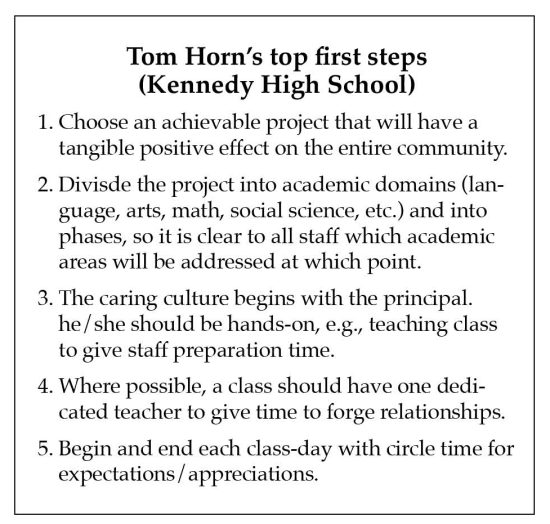 The last word goes to Tom Horn, ‘As a student teacher, I kept asking these fundamental questions – by raising reading levels are we seeing kids matriculate into college or do great things with their lives? And there wasn’t necessarily a corollary between their academic scores and their potential as human beings…. And seeing five years down the road some of them are incarcerated – these were some risky kids. And at the same time you ask all these questions about the environment, whether its global warming or forest floor ecology and the issues we see in our own back yard here. Those are things I always thought about as an environmentalist. And there was a disconnect between the real world and education. Education was almost a form of segregation…. Now we are in a very interesting time in history educationally in this country. There were 6.9 million drop outs last year. Kids are feeling disaffected by the educational system. But kids [at Kennedy] are accepting responsibility for their role here because they understand that we are significantly different’.
The last word goes to Tom Horn, ‘As a student teacher, I kept asking these fundamental questions – by raising reading levels are we seeing kids matriculate into college or do great things with their lives? And there wasn’t necessarily a corollary between their academic scores and their potential as human beings…. And seeing five years down the road some of them are incarcerated – these were some risky kids. And at the same time you ask all these questions about the environment, whether its global warming or forest floor ecology and the issues we see in our own back yard here. Those are things I always thought about as an environmentalist. And there was a disconnect between the real world and education. Education was almost a form of segregation…. Now we are in a very interesting time in history educationally in this country. There were 6.9 million drop outs last year. Kids are feeling disaffected by the educational system. But kids [at Kennedy] are accepting responsibility for their role here because they understand that we are significantly different’.
Becs Boyd is exploring place-based education programs throughout the Pacific Northwest through a Churchill fellowship. Her blog can be found at http://pbechurchillfellowship.blogspot.com/
